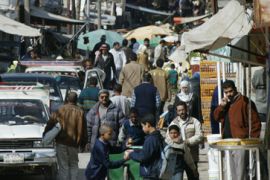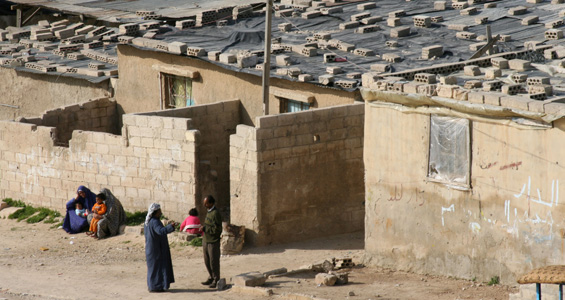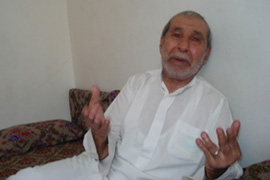Refugees expect little from Fatah
Palestinian refugees in Jordan say the movement no longer represents them.

 |
| Al-Baqaa refugee camp is home to more than 80,000 Palestinian refugees [GALLO/GETTY] |
As Fatah convenes its long-awaited sixth general conference in Bethlehem, some Palestinian refugees in Jordan say they are not expecting anything positive to emerge from the movement that once represented them.
Fatah was originally established by Yasser Arafat, the late Palestinian president, with a charter that called for armed struggle against Israel.
But decades later, many refugees believe that the movement’s original mandate has been distorted by Western and Israeli pressure to transform it into a ‘peace partner’.
Many say that a series of concessions have led to a drop in the movement’s popularity in the camps and some I spoke with said they were not at all interested in the conference.
They believe the Palestinian Authority (PA) had long ago sidestepped its responsibilities and that Fatah will likely not address issues related to refugees at the Bethlehem meeting.
Distrust in leadership
 |
| Ismael is a former Fatah fighter but he says the movement no longer represents him |
Jordan’s Palestinian refugee camps used to be a stronghold for Fatah fighters but that mood has changed.
I visited the home of 77-year-old Sheikh Ismael Abu Hmeidan, a former fighter in Fatah’s armed al-Asifa wing who has been living in exile in the al-Baqaa refugee camp for the past 50 years.
He lived through the Nakba, the 1967 war and spent eight years in a Jordanian prison for being a member of the Arab Communist party.
In 1972, he joined Fatah.
Abu Hmeidan told me that he had turned down an offer to participate in the conference because he refuses to visit the Israeli embassy in Amman, which would have facilitated his entry into the Occupied Territories.
While he still believes in Fatah as a liberation movement he disagrees with and distrusts the leadership participating in the conference.
“What Fatah is fighting for is the creation of a united moderate front with Israel against Iran,” he said.
“But who exactly has been defending and supporting Arab national movements? Isn’t that Iran?
“How are those Palestinians who joined hands with Israel going to build anything good and and right for us?”
He says that when he was a fighter he did not carry his rifle to help the Israelis consolidate their occupation, but that that is “exactly what Fatah has done”.
‘Exactly like Israel’
Other refugees in the alleyways which criss-cross the al-Baqaa camp say they have no confidence that their voices are being heard by Mahmoud Abbas, the Fatah leader and Palestinian president.
“Fatah doesn’t represent me. The mere mention of Fatah is exactly like the mere mention of Israel,” says Raddad Abu Zirr, who is originally from the Gaza Strip.
“We don’t know Fatah, it has nothing to do with us, and we don’t know Mahmoud Abbas. We are suffering here in exile and no one has come up with a solution for us.”
Rajab, another refugee, said that he feels Fatah is the reason he is still living in the camp and cannot make ends meet.
Nevertheless, there are some who have tired of the frustration and ill-feelings toward all Palestinian factions.
They remain optimistic that Fatah will achieve something measurable in this conference and provide Palestinians with a glimmer of hope that their crisis might actually come to an end.
A new revolution
| In depth |
|
|
Shaker al-Jawhari, the editor-in-chief of the al-Mustaqbal Arabic electronic newspaper and a former Fatah member, says that frustrated Palestinians will soon start to take matters into their own hands.
“Compromising on the Palestinian people’s right to resistance is exactly what will ignite a new resistance revolution, especially at a time when the Israeli community is witnessing more radicalism and refusing to give Palestinians any rights.”
He believes that those who have lost all hope that their national aspirations will be fulfilled by their current representatives, will eventually resort to revolution.
Al-Jawhari says Israel and the US wanted the Fatah conference to take place in the Occupied Territories because this symbolises a victory for them.
He accuses Fatah of having become an “occupation management movement” rather than the liberation movement it is supposed to be.
Al-Jawhari’s criticism is echoed by other refugees who believe Fatah’s merger into the PA after the Oslo Accords in 1993, distorted the movement’s original identity, which has been further diluted by its efforts to prove itself as a reliable ‘partner for peace’.
As the delegates meet in the West Bank many refugees who still live in temporary camps some 44 years after Fatah was created and 20 years after it last convened, are left wondering just what Fatah has done for them.

